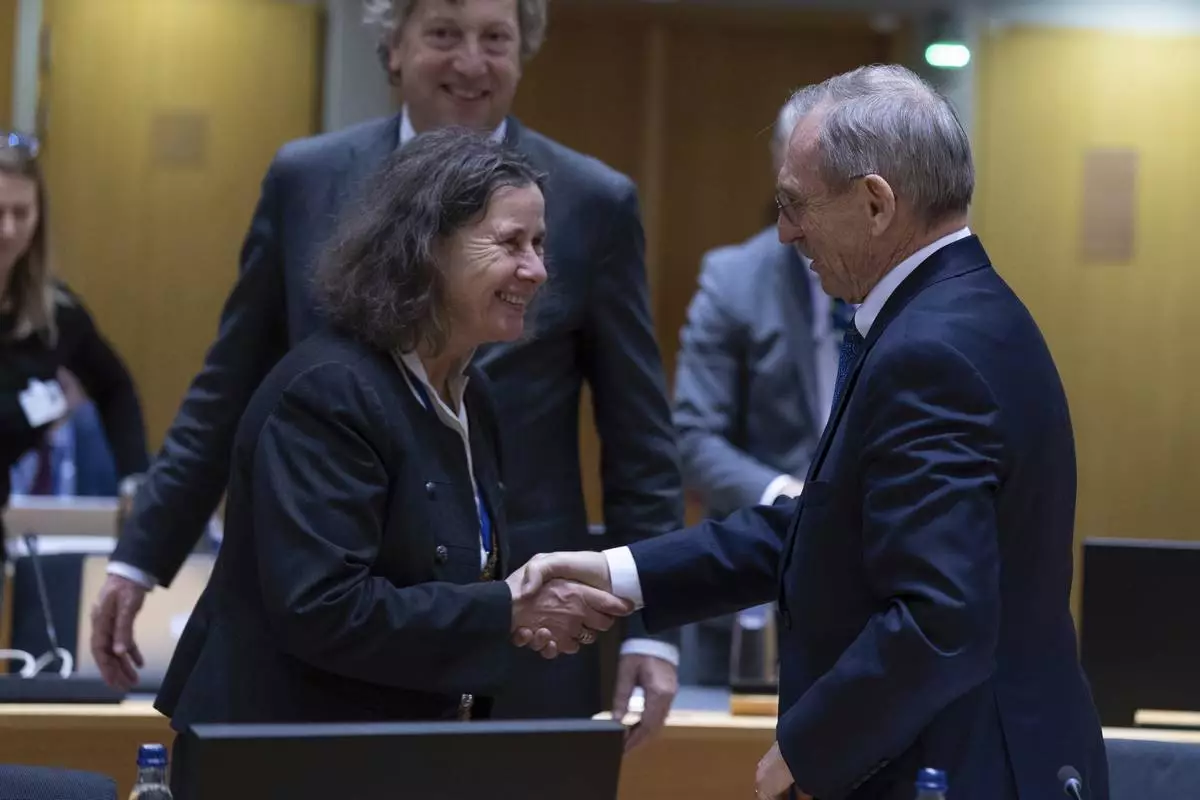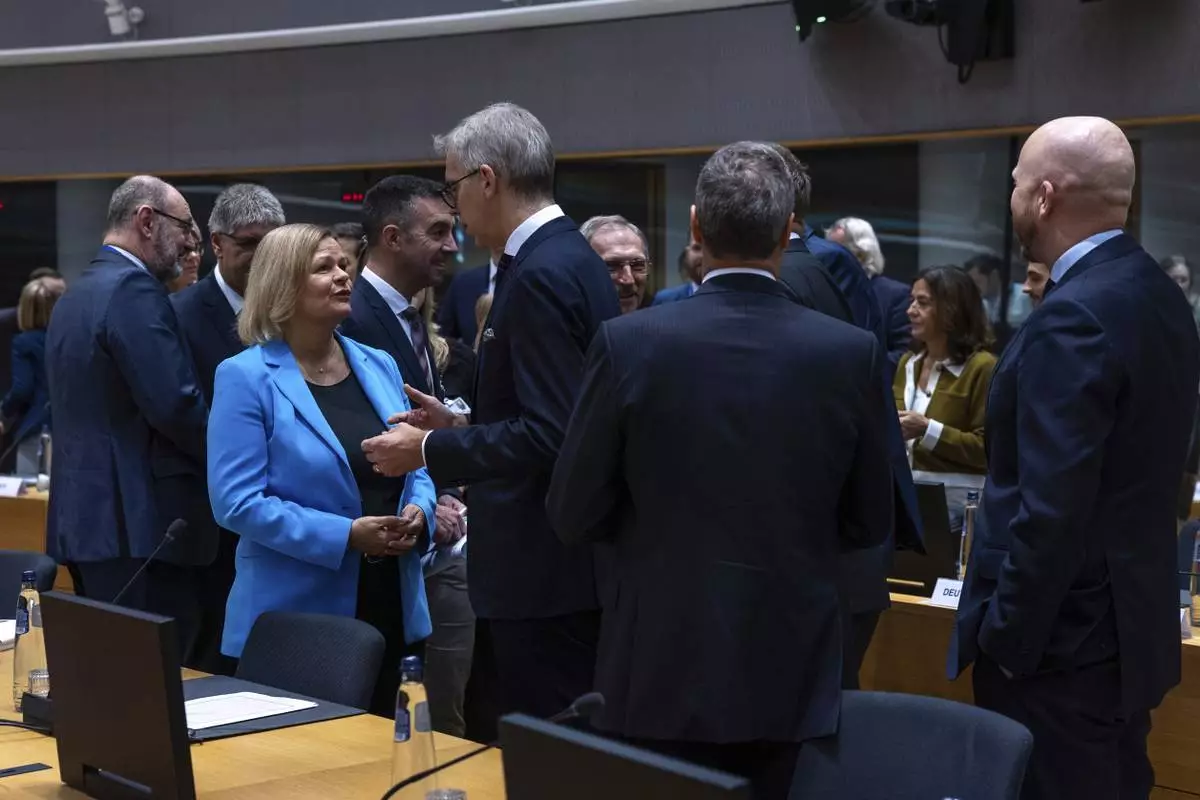BRUSSELS (AP) — Some European Union countries on Thursday doubled down on their decision to rapidly halt asylum procedures for Syrian migrants in Europe, but said that it was too early to consider sending any of the hundreds of thousands of people who have fled since 2011 back home.
Austria, Belgium, Germany, Greece, Finland, Ireland, Sweden and non-EU country Norway suspended asylum applications from Syrians in the wake of Bashar Assad’s fall. France is weighing whether to take similar action, at least until Syria’s new leadership and security conditions become clearer.
The decisions do not mean that Syrian asylum-seekers will be deported. The EU’s executive branch, the European Commission, has said that currently “the conditions are not met for safe, voluntary, dignified returns to Syria.”
“We need to wait a few more days to see where Syria is heading now,” German Interior Minister Nancy Faeser said. “What is the situation? What about the protection of minorities? What about the protection of the people? And then, of course, there could be repatriation.”
Asked by reporters whether it would make sense to organize repatriations at an EU level, Faeser said “it would be very expedient to organize this together."
But she stressed that Syrians who work in Germany and abide by its laws are welcome to stay. Over 47,000 asylum claims by Syrians are pending in Germany, a main destination in Europe for those who have fled since 2011.
“This is not a long term pause as far as I’m concerned,” Irish Justice Minister Helen McEntee told reporters. “It’s really positive that the Assad regime has come to an end. At the same time, we can all see that it’s not clear what will happen next.”
The arrival in Europe in 2015 of well over 1 million refugees –- most fleeing the conflict in Syria –- sparked one of the EU’s biggest political crises as nations bickered over who should host them and whether other countries should be forced to help. Those tensions remain even today.
Almost 14,000 Syrians applied for international protection in Europe this year up to September, according to the EU’s asylum agency. Around 183,000 Syrians applied for asylum in all of last year. On average, around one in three applications are accepted.
Already on Monday, despite deep uncertainty about the country’s future, hundreds of Syrian refugees gathered at two border crossings in southern Turkey, eagerly anticipating their return home following the fall of Bashar Assad’s government.
In the days since Assad’s abrupt fall, rebel leader Ahmad al-Sharaa, formerly known as Abu Mohammed al-Golani, has sought to reassure Syrians that the group he leads — Hayat Tahrir al-Sham, or HTS – does not seek to dominate the country and will continue government services.
HTS appears on the EU’s anti-terrorism sanctions list as an affiliate of Al-Qaeda. That freezes any assets it has in Europe and prevents European citizens and companies from doing business with the group or funding it. Al-Golani is subject to a travel ban and asset freeze.
Belgium’s interior ministry said Thursday that the whole of the 27-nation EU must monitor Syrian migration flows, amid concern that Assad loyalists might seek refuge in Europe.
It said that around 100 of its nationals are in Syria, and that intelligence services believe that eight of them might have links to HTS.
On Tuesday, the EU’s top diplomat expressed concern that Syria might violently fall apart like neighboring Iraq, or Libya and Afghanistan if its territorial integrity and the rights of minorities are not protected.
“The transition will present huge challenges in Syria and in the region,” EU foreign policy chief Kaja Kallas told European lawmakers during a special hearing.
The U.N.’s refugee agency has called for “patience and vigilance” in the treatment of Syrians who have sought international protection, and believes that much will depend on whether Syria’s new leaders are prepared to respect law and order.
Kirsten Grieshaber in Berlin contributed to this report.

Hungary's Interior Minister Sandor Pinter, center-left, speaks with Romania's interior Minister Catalin Predoiu, left, Bulgaria's Interior Minister Atanas Ilkov, center-right, and Slovenia's Interior Minister Bostjan Pokjukar during a round table meeting of EU justice and interior ministers at the European Council building in Brussels, Thursday, Dec 12, 2024. (AP Photo/Omar Havana)

Marjolein Faber, Minister of Asylum and Migration of the Netherlands, left, greets Hungary's Interior Minister Sandor Pinter during a round table meeting of EU justice and interior ministers at the European Council building in Brussels, Thursday, Dec. 12, 2024. (AP Photo/Omar Havana)

Germany's Interior Minister Nancy Faeser, left, speaks with Luxembourg's Interior Minister Leon Gloden, center, during a round table meeting of EU justice and interior ministers at the European Council building in Brussels, Thursday, Dec. 12, 2024. (AP Photo/Omar Havana)
WASHINGTON (AP) — President Joe Biden is commuting the sentences of roughly 1,500 people who were released from prison and placed on home confinement during the coronavirus pandemic and is pardoning 39 Americans convicted of nonviolent crimes. It's the largest single-day act of clemency in modern history.
The commutations announced Thursday are for people who have served out home confinement sentences for at least one year after they were released. Prisons were uniquely bad for spreading the virus and some inmates were released in part to stop the spread. At one point, 1 in 5 prisoners had COVID-19, according to a tally kept by The Associated Press.
Biden said he would be taking more steps in the weeks ahead and would continue to review clemency petitions. The second largest single-day act of clemency was by Barack Obama, with 330, shortly before leaving office in 2017.
“America was built on the promise of possibility and second chances,” Biden said in a statement. “As president, I have the great privilege of extending mercy to people who have demonstrated remorse and rehabilitation, restoring opportunity for Americans to participate in daily life and contribute to their communities, and taking steps to remove sentencing disparities for non-violent offenders, especially those convicted of drug offenses.”
The clemency follows a broad pardon for his son Hunter, who was prosecuted for gun and tax crimes. Biden is under pressure from advocacy groups to pardon broad swaths of people, including those on federal death row, before the Trump administration takes over in January. He’s also weighing whether to issue preemptive pardons to those who investigated Trump’s effort to overturn the results of the 2020 presidential election and are facing possible retribution when he takes office.
Clemency is the term for the power the president has to pardon, in which a person is relieved of guilt and punishment, or to commute a sentence, which reduces or eliminates the punishment but doesn’t exonerate the wrongdoing. It’s customary for a president to grant mercy at the end of his term, using the power of the office to wipe away records or end prison terms.
Those pardoned Thursday had been convicted of nonviolent crimes such as drug offenses and turned their lives around, White House lawyers said. They include a woman who led emergency response teams during natural disasters; a church deacon who has worked as an addiction counselor and youth counselor; a doctoral student in molecular biosciences; and a decorated military veteran.
The president had previously issued 122 commutations and 21 other pardons. He's also broadly pardoned those convicted of use and simple possession of marijuana on federal lands and in the District of Columbia, and pardoned former U.S. service members convicted of violating a now-repealed military ban on consensual gay sex.
Rep. Jim McGovern, D-Mass., and 34 other lawmakers are urging the president to pardon environmental and human rights lawyer Steven Donziger, who was imprisoned or under house arrest for three years because of a contempt of court charge related to his work representing Indigenous farmers in a lawsuit against Chevron.
Others are advocating for Biden to commute the sentences of federal death row prisoners. His attorney general, Merrick Garland, paused federal executions. Biden had said on the campaign trail in 2020 that he wanted to end the death penalty but he never did, and now, with Trump coming back into office, it’s likely executions will resume. During his first term, Trump presided over an unprecedented number of federal executions, carried out during the height of the pandemic.
More pardons are coming before Biden leaves office on Jan. 20, but it's not clear whether he'll take action to guard against possible prosecution by Trump, an untested use of the power. The president has been taking the idea seriously and has been thinking about it for as much as six months — before the presidential election — but has been concerned about the precedent it would set, according to people familiar with the matter who spoke to The Associated Press on condition of anonymity to discuss internal discussions.
But those who received the pardons would have to accept them. New California Sen. Adam Schiff, who was the chairman of the congressional committee that investigated the violent Jan. 6 insurrection, said such a pardon from Biden would be “unnecessary,” and that the president shouldn’t be spending his waning days in office worrying about this.
Before pardoning his son, Biden had repeatedly pledged not to do so. He said in a statement explaining his reversal that the prosecution had been poisoned by politics. The decision prompted criminal justice advocates and lawmakers to put additional public pressure on the administration to use that same power for everyday Americans. It wasn’t a very popular move; only about 2 in 10 Americans approved of his decision, according to a poll from The Associated Press-NORC Center for Public Affairs Research.

President Joe Biden speaks at the White House Conference on Women's Health Research from the East Room of the White House in Washington, Wednesday, Dec. 11, 2024. (AP Photo/Susan Walsh)













